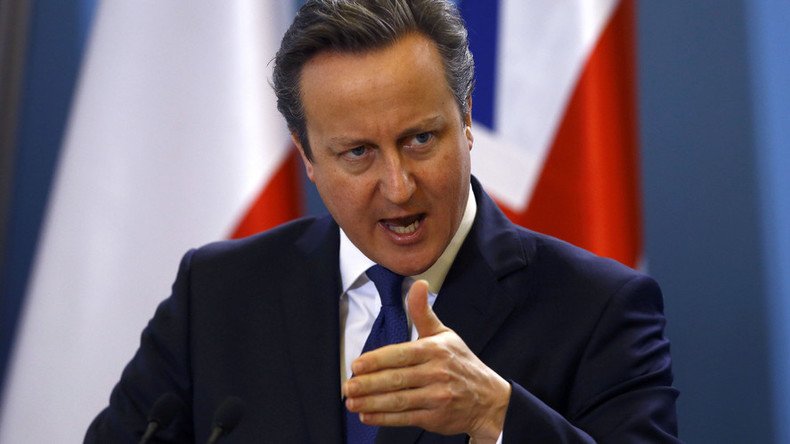EU negotiations: Brexit beckons if Cameron fails to secure ‘good deal for Britain’

Prime Minister David Cameron hopes to convince European nations to fundamentally change Britain’s relationship with the EU, as leaders meet in Brussels for a two-day make-or-break summit.
Cameron faces one of the biggest challenges of his premiership on Thursday evening, as he attempts to persuade EU member states to back his plan to curb welfare benefits for EU migrants.
The PM has promised Euroskeptics he will “get the best deal for Britain.” The odds are increasingly stacked against him, however, as German Chancellor Angela Merkel stated on Wednesday night she will not allow “discrimination” against migrants.
RT delves into four key questions raised by this historic summit.
What does Cameron want?
Cameron has demanded key changes to Britain’s relationship with the EU, the most contentious of which is the right for Westminster to prohibit European migrants from accessing state benefits until they have worked in the UK for four years.
The PM believes this will reduce the “pull factors” for migrants entering Britain and appease hardline Euroskeptics in the Conservative Party and the UK Independence Party (UKIP).
Cameron retreats on EU reform, pushes renegotiation back to 2016 https://t.co/ECWilT5mBopic.twitter.com/EVTk4ysjbJ
— RT UK (@RTUKnews) December 4, 2015Cameron also wants to create a less bureaucratic, more democratic European Union with greater competition between member states.
Chancellor George Osborne has been an outspoken critic of attempts by Brussels to bring in stronger financial regulations. The PM is therefore seeking special protections in EU law for Britain’s financial industry.
Who are Cameron’s allies?
Ireland’s Taoiseach (Prime Minister) Enda Kenny has suggested he will listen to Cameron’s plans for benefit reform, but admitted it is a “really complex issue and one that is a difficulty for everybody.”
Kenny said the British PM will have to “flesh out” his plans and the “implications for the movement of people.”
Paris attacks drive majority of Brits to back leaving EU – poll https://t.co/LLvrXuNFZ2pic.twitter.com/5jVcbQSdLh
— RT UK (@RTUKnews) November 24, 2015According to Professor Henrik Larsen of the University of Copenhagen, Denmark’s center-right government supports Cameron’s desire to restrict benefits access to EU workers. The Liberal government’s policy program, issued at the end of June, said it would “work with like-minded countries in order to revise EU rules on welfare benefits for mobile workers as soon as possible.”
Italy, the Netherlands and Sweden support the idea of a more democratic, competitive union. Italian Prime Minister Matteo Renzi backs the PM’s campaign for less bureaucracy and more democracy in the EU, while being less enthusiastic on other areas of Cameron’s reforms.
Who opposes Cameron’s reforms?
Merkel is the PM’s strongest opponent to reform. Speaking in the Bundestag on Wednesday evening, she said Germany would not negotiate on EU principles such as a freedom of movement.
“We want to come to an agreement that the British government can successfully use to promote remaining in the EU in the planned referendum,” she said.
“[But] we are not willing to and we will not call into question the fundamental achievements of European integration. These include in particular the principle of freedom of movement and the principle of non-discrimination between European citizens. These principles are not negotiable.”
The PM also faces opposition from Eastern European member states, with Polish Prime Minister Beata Szydło having told Cameron she did not “see eye to eye” with the UK over plans to restrict access to benefits when the two leaders met last week.
Slovakia has also voiced objections to the plans, with its ambassador to the EU saying “we cannot create two categories of EU citizens.”
France, Belgium, the Czech Republic, Sweden and Romania have all indicated they are against the PM’s proposals to restrict access to welfare.
Will Cameron succeed?
Most EU member states recognize it is in their interest for Britain to remain part of the EU, but the big question is how far they are willing to compromise in order to meet Cameron’s demands.
The PM’s flagship demand, for national governments to be granted the power to restrict benefits for EU migrants, is also the most contentious and opposed proposal.
Merkel’s insistence that the issue is “non-negotiable” deals a heavy blow to Cameron’s hopes to achieving this key condition and in the process appeasing the Euroskeptic, anti-immigrant sentiment at home.
US official warns Britain to stay in EU or risk trade restrictions https://t.co/OEZ7I8oqXhpic.twitter.com/UkRaI6Hbdf
— RT UK (@RTUKnews) October 29, 2015An ICM survey published on Tuesday indicates public opinion in the UK is evenly split on whether Britain should leave or remain in the EU. While the poll strengthens the PM’s hand in negotiations taking place on Thursday and Friday, it also illustrates the risk of Cameron’s plan for EU reforms backfiring, increasing support for Brexit ahead of a referendum.
Thursday and Friday’s summit acts as a precursor to a bigger, longer convention taking place with EU member states in February. If a deal is struck, it will take place during this meeting.
Nonetheless, December’s conference will give Europe a rough idea of Cameron’s chances of success and the future of the EU as a whole.











